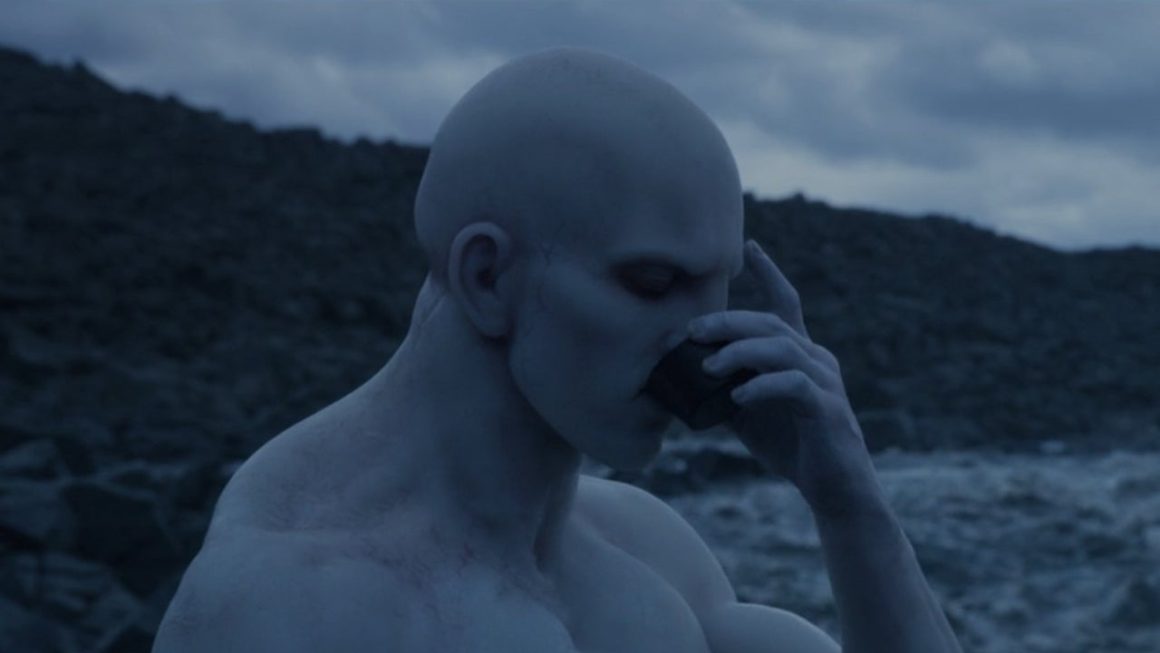An “unexpected life form” that has the look of a pitch black, tar-like substance was found on a boat docking in Cleveland, Ohio — and needless to say, fans of both the Alien and X-Files franchises are having a field day online wondering if this is the start of a new black goo-themed film or episode.
So, you’re definitely wondering three things right now: where, when, and how? So here we go! A research vessel called the Blue Heron started having mechanical difficulties while observing harmful algae in Lake Erie last autumn, which led the ship to dock in Cleveland. When it did, it was removed from the water to be examined for issues — and that’s when Captain Rual Lee noticed the unknown substance oozing from the ship’s rudder, which is something he would not have seen had he not taken the ship for dry maintenance.

He asked scientists at University of Minnesota Duluth to investigate after he found the substance left no sheen in water, nor did it burn when set aflame. When the staff ran tests on the substance, they found “about 20 DNA sequences, or genomes, and ran them through a worldwide computer database” and “most of the sequences matched known genomes found elsewhere in the world… but a few were less identifiable, including one that was completely novel,” according to Cleveland.com.
The substance, which is thought to be a single-celled organism, is now being temporarily called ShipGoo1. “The biggest surprise was that the ship goo had life in it at all,” lead researcher Cody Sheik, a biologist at UMD and LLO, explained. “We thought we’d find nothing. But surprisingly, we found DNA and it wasn’t too destroyed, nor was the biomass too low.”
Naturally, fans of both beloved science fiction franchises had their curiosity piqued. After all, with the Alien series, there’s a clear connection; the black goo is the key ingredient in the birth of the Xenomorph — the series’ central creature — as a species many years prior to the start of the franchise. Ridley Scott’s 2012 prequel Prometheus set the ball rolling on the Alien black goo, and fans have debated exactly how it works ever since. Additionally, we come to find out down the line that Weyland-Yutani, the antagonistic corporation at the heart of the franchise, extracts black goo from the Xenomorphs to use for their own ends.
In the X-Files world, fans were probably reminded of the show’s alien virus called Purity, or Black Oil, which lived in petroleum deposits underground and was sentient. It infected humans via their eyes, mouth, nose, and ears, and could take full control of the body with the intent to further their species. The substance is first referenced in the franchise in the very first season of the show in the episode titled “The Erlenmeyer Flask,” but makes its first real appearance in Season 3, in the episode titled “Piper Maru.”
On Reddit, diehards for both franchises flooded the comments with funny quips on posts made about the mystery, proposing it might be the start of something worthy of either or both series. “Is it LV-426 goo, or like X-Files black alien goo?” one Redditor asked in a post on r/LV426 about the discovery, while another wrote, “Scully and Mulder we need you.”
A third user made a hilarious observation that touches on the latest expansion of the Alien franchise, due to hit Hulu in August. “Hell yeah they are marketing the f—k out of Alien: Earth!” they wrote.
But ultimately, one fan really summed the whole thing up: “Do you want Xenomorphs? Because this is how you get Xenomorphs.”
Of course, we don’t have much to worry about. Speaking to GreatLakesNow, University of Michigan professor Gregory Dick said scientists are nowhere near discovering all forms of life on earth. “We don’t study those environments very well, so I think that’s fascinating that they’re finding novel microbes in there but I’m not too surprised.” he said.
Lex Briscuso is a film and television critic and a freelance entertainment writer for IGN. You can follow her on Twitter at @nikonamerica.



